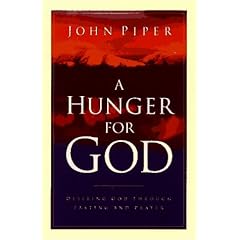 Tim Chester@ http://timchester.wordpress.com has put some interesting comments together on fasting. He covers:
Tim Chester@ http://timchester.wordpress.com has put some interesting comments together on fasting. He covers:What is fasting?
- 1 Corinthians 7:5
Should Christians fast?
- Matthew 6:16-18
- Acts 13:1-3; 14:23
- Matthew 9:14-17
- Luke 2:36-38
What is the purpose of fasting?
1. To seek guidance from God: Acts 13:1-3
2. To seek satisfaction in God: Matthew 6
Using a hunger for food to cultivate a hunger for God- Food as refuge
- Food as distraction:
Rediscovering the goodness of food
Using a hunger for food to combat sexual temptation
How should we fast?
1 Timothy 4:1-5
Danger:
The second danger is to think we can earn merit with God through abstinence. Fasting does not earn God’s approval or blessing. It is not the Pharisee who fasts who goes home justified in the parable Jesus tells in Luke 18:12-14, but the sinner who cries out for mercy. ‘It’s true that we can’t win God’s approval by what we eat. We don’t miss out on anything if we don’t eat, and we don’t gain anything if we do.’ (1 Corinthians 8:8). Fasting, like other ascetic practices, cannot of itself restrain indulgence (Colossians 2:20-23). And fasting done for selfish gain which disregards other people is an abomination in God’s sight (Jeremiah 14:12; Zechariah 2:5; Isaiah 58:3).
You could consider one of the following:
– a regular 24 hours fast - eat an evening meal one night and then break your fast with a light supper the following evening
– a regular day fast - eat an evening meal and break your fast with breakfast the day after next
– a fast for guidance - fast for a period leading up to a significant meeting or throughout a significant time together
See: John Piper’s book, A Hunger for God: Desiring God Through Fasting and Prayer
No comments:
Post a Comment